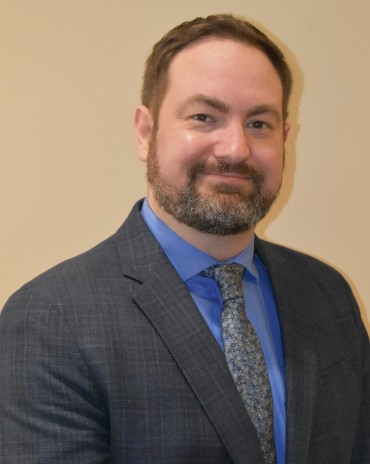Jared Cook

Assistant Professor of Leadership
Phone Number: 402.826.6738Department: Business Administration
Office: GA404
Email: jared.cook@doane.edu
Primary Campus: Crete
Credentials: MS, EDD
Dr. Jared Cook is Assistant Professor of Leadership in the College of Business. He serves as the Chair of the Leadership Department. Jared joined Doane University in 2019 and primarily teaches classes for the following programs: Leadership Studies, and the Masters of Arts in Leadership. He earned an Ed.D. (2019) from the University of South Dakota and an M.S. in Education (2016) from Fort Hays State University. He co-authored a book on post-traditional learning and has published several refereed articles on the topics of adult learning, educational simulations, and civic engagement. In addition, Jared designed Doane University's Leadership Studies Certificate. Outside of Doane, he assists the National Association of Student Personnel Administrators (NASPA) at the regional and national levels. Most recently, he helped design and implement changes for NASPA's 2021 online conference, working with a committee focused on inclusion and accessibility.
Education
Ed.D. (Education Administration & Leadership), University of South Dakota, 2019
M.S. (Education), Fort Hays State University, 2016
B.S. (Psychology), Rochester Institute of Technology, 2013
Courses
- Introduction to Leadership Studies (LDR 101)
- Leadership Practicum Seminar (LDR 401)
- Ethics in a Business Environment (BUS 365)
- Leadership Practicum Seminar (LDR 401)
- Professional Leadership Seminar (LDR 402)
- Human Centered Problem Solving & Design Thinking (LDR 630)
- Leading and Communicating in a Dynamic Society (LDR 640)
Professional Experience
Assessment Committee, Doane University, 2019
Assessment Advisor/Dissertation Support, University of South Dakota 2018-2019 NASPA Fellow, Assessment Consultant, Fort Hays State University, 2015-2016
Teaching Experience
Doane University, 2018-present
University of South Dakota, 2018-2019
Colby Community College, 2016
Fort Hays State University, 2014-2016
Professional Accolades
Technology Knowledge Community Outstanding Graduate Award, NASPA, 2016
Men of Merit Award, Fort Hays State University, 2016
Professional Highlights
- Cook, J. S. (2019). Teaching approaches in undergraduate settings with adults: A structured review of empirical literature. ProQuest Dissertations & Theses Global. (2307477701).
- Cook, J. S., & Williams, N. (2019). Rebranding nontraditional as post-traditional: Can a name change promote student success? NASPA Knowledge Community Conference Publication.
- Cook-Benjamin, L., & Cook, J. S. (2019). Redefining post-traditional learning: Emerging research and opportunities. IGI Global. Hershey, PA.
- Cook, J. S., & Card, K., (2018). The oppression of adult learners: The impact of traditional pedagogy, banking theory, and university budget constraints on international learners. AAACE Proceedings.
- Cook, J. S. (May, 2018). Adult Learners: The Single Greatest Resource You May Be Missing on Your Campus. Ideafest, University of South Dakota, Vermillion, SD.
- Bowhay, V. E., & Cook, J. S. (2016). Finding common ground: Universities and families working together. NASPA Knowledge Community Conference Publication.
- Board Member and Community Representative for the National Association of Student Personnel Administrators
How did you become interested in teaching?
I think one of the biggest turning points in my life was attending my master's program. Attending each day, I finally felt like a person rather than a number. The care and commitment from my instructors pushed me to work hard and commit to my goals. After meeting great mentors, I felt the drive to give back. After my masters, I started teaching GED courses. I decided to take the next step and pursue my doctorate, where I became an adjunct instructor for Doane. Following my doctorate, I decided to continue at Doane full time and never looked back!
What advice do you have for students?
Considering my coursework, I think there are two things that define an "A" student. First, the willingness to learn and ask for help. As I explained earlier, I teach some courses that can produce frustration or anxiety for students such as statistics. Students who come in with a pre-conceived notion of their ability, as well as how they will perform in the class often spend more time fighting through the course then those who ask questions and use time effectively. By coming in with a willingness to grow, learn and communicate, I see many students who have said they "just aren't good at math" be highly successful. I think the second piece of advice is to show up, even if it's optional. One of the best indicators of success in my course is the difference in students showing up. Often, students who show up get their questions answered right away, which makes it easier to curb any missteps or misunderstandings on the content!
What is your teaching style?
I teach a wealth of subjects (leadership, ethics, statistics, management), so you may come across me in your undergraduate or graduate career. I chose to pursue a mix of courses students seem to naturally love (i.e. leadership) and potentially courses that students may be nervous to take (i.e. statistics/ethics). I chose this for several reasons, but one core reason is my desire to help others succeed in the face of adversity. As a student, I found that many of those courses I was nervous about could be made infinitely better or worse depending on the instructor. Thus, I strive to create a course that allows for flexibility and a lot of one-on-one consultation. Considering all these different courses, you can expect to learn both the required material as well as soft skills.
